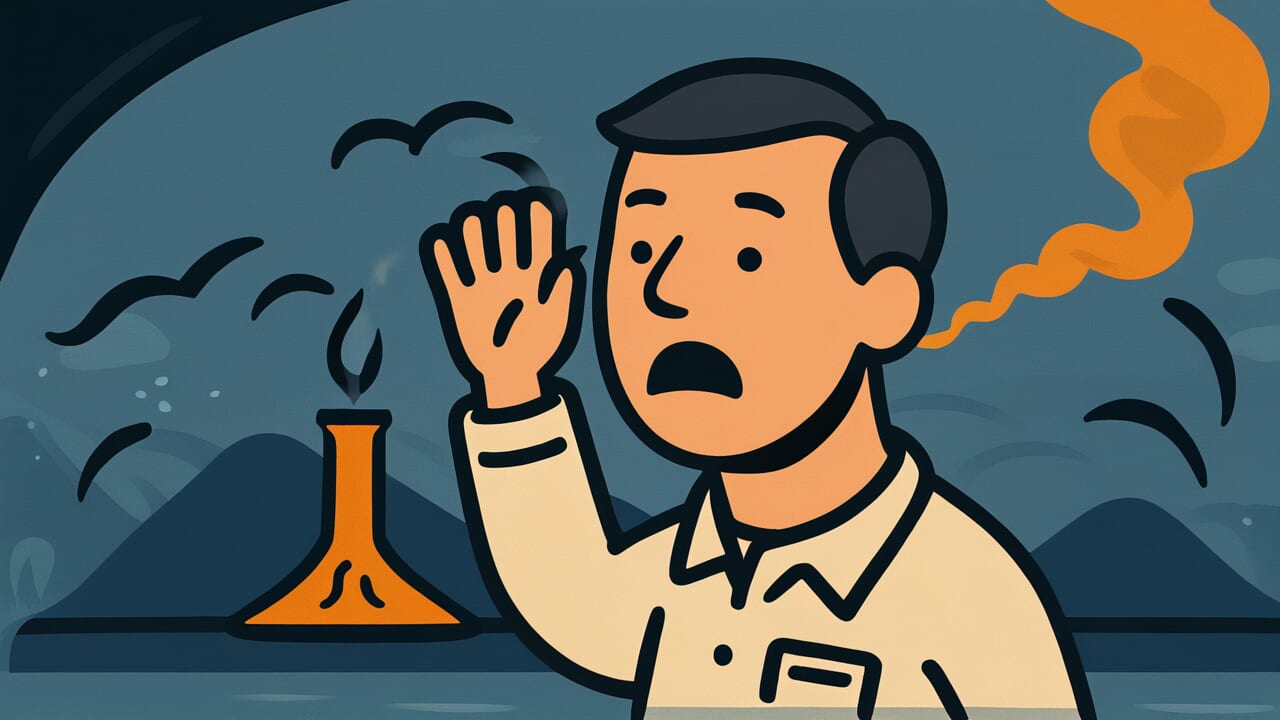How to Read “Wanting to blow ashes without getting dust in your eyes”
Hai wo fuite meisuru nakaran to hossu
Meaning of “Wanting to blow ashes without getting dust in your eyes”
This proverb describes holding impossible wishes or unrealistic expectations. It points to the contradictory attitude of creating a cause yourself while hoping to avoid its natural consequences.
When you blow on ashes, they inevitably fly up into the air. Some will likely get in your eyes. This is an unavoidable cause-and-effect relationship.
Yet wishing “I hope no dust gets in my eyes” while blowing ashes makes no logical sense. This proverb warns against such unreasonable expectations.
Today, we use it when people take risky actions but want to avoid bad results. It also criticizes those who seek rewards without effort.
The proverb teaches us how foolish it is to ignore cause and effect. You cannot expect only convenient outcomes while dismissing the natural consequences of your actions.
Origin and Etymology
This proverb likely comes from ancient Chinese classics. The character “眯” means to squint or to have something in your eye that makes seeing difficult.
When you blow on ashes, they naturally scatter upward and get in your eyes. Yet wishing “may no dust enter my eyes” is clearly contradictory behavior.
Behind this expression lies the image of people who do not understand cause and effect. They want only convenient results.
The act of blowing ashes itself causes dust to enter your eyes. Wishing to avoid only that result is logically impossible.
Ancient China left many teachings that warned against such contradictory wishes and actions. The word “矛盾” (contradiction) itself comes from a merchant who tried to sell both a spear that could pierce any shield and a shield that could block any spear.
Similarly, this proverb uses a concrete everyday action to express the foolishness of holding unreasonable wishes that ignore cause and effect.
It came to Japan along with classical Chinese learning and has been passed down as a moral lesson.
Usage Examples
- Wanting good test scores without studying is like “wanting to blow ashes without getting dust in your eyes”
- Continuing an unhealthy lifestyle while hoping to stay healthy is exactly “wanting to blow ashes without getting dust in your eyes”
Universal Wisdom
This proverb has been passed down through generations because it sharply points out a fundamental human contradiction. We all have the desire to obtain only convenient results.
We want to avoid effort but still achieve success. We want to avoid risk but gain big returns. Somewhere in our hearts, we harbor such selfish wishes. This is simply human nature.
This contradictory desire comes not from lack of logical thinking but from the essence of human emotion. We are emotional beings.
Our wish for “how we want things to be” comes first. The calm judgment of “is this logically possible” gets pushed aside.
We turn away from unpleasant tasks and difficulties right in front of us. We dream only of good results. This is human weakness, but also the flip side of our power to keep hoping.
Our ancestors deeply understood this human nature. That is why they used the concrete action of blowing ashes, something anyone can imagine, to teach the importance of cause and effect.
No result exists without a cause. This simple truth is easy to forget. This proverb continues to sound a gentle but certain warning bell for us.
When AI Hears This
Ash is the final product after wood or paper burns. Chemically speaking, combustion is a reaction where complex organic matter combines with oxygen and breaks down into carbon dioxide, water, and ash.
This means wood with an orderly structure has become a disordered state that can never return to its original form.
The second law of thermodynamics calls this measure of disorder entropy. In nature, entropy always increases.
What is interesting is the double irreversibility of blowing ashes. First, combustion turns wood into ash, which cannot return to its original form.
Then when you blow the ash, fine particles scatter into space. Gathering scattered particles and returning them to their original place is theoretically possible but requires enormous energy in practice.
Imagine trying to return every single grain of sand scattered throughout a room back into its original box.
What is even more cruel is that some of this scattered ash enters your own eyes. Actions that increase entropy, that spread disorder, inevitably affect the surroundings.
The person who blew the ash is closest, so probability theory shows they have the highest chance of suffering harm.
If you try to spread disorder against the laws of the universe, you will always pay the price. This is the cold truth that physical laws teach.
Lessons for Today
This proverb teaches modern people the importance of calmly examining the relationship between actions and results. We make inflammatory statements on social media but do not want criticism.
We expect good grades without studying. In daily life, we repeatedly commit small acts of “wanting to blow ashes without getting dust in your eyes.”
What matters is this: if you want a certain result, create the right cause that leads to it. If you want to be healthy, live a healthy lifestyle. If you want to be trusted, act with integrity.
This sounds obvious, but for us who are easily swayed by emotions, practicing the obvious is surprisingly difficult.
But thinking from the opposite angle reveals hope. If you create the right causes, your chances of approaching your desired results increase.
Give up convenient wishes and accumulate steady effort. This may seem like a detour, but it is actually the most reliable path.
If you have a future you desire, why not start creating its causes today? Even a small step will surely move you forward.



Comments